Brexit & Beyond newsletter
11 July 2024
 Welcome to the 11 July 2024 Brexit & Beyond newsletter
Welcome to the 11 July 2024 Brexit & Beyond newsletter
This newsletter covers two weeks to take account of the UK General Election on 4 July and we’ll return with our next issue in the new Assembly term in September.
New Prime Minister Sir Keir Starmer visited the Assembly on Monday along with new Secretary of State for Northern Ireland Hilary Benn. In plenary, Ministers brought draft regulations to the Chamber for approval. This dealt with financial support for fisheries and shared parental, parental bereavement, adoption and paternity leave. The Assembly also heard statements on meetings of the North South Ministerial Council. The deputy First Minister also made a statement in the Chamber about the British-Irish Council’s forty-first summit on the Isle of Man.
Assembly committees were busy as summer recess approached. The Committee for Agriculture, Environment and Rural Affairs received a number of briefings relating to legacy EU Common Market Organisation (CMO) schemes. The Committee also noted the Draft Producer Responsibility Obligations Regulations 2024 which deals with obligations for producers in respect of packaging and waste.
The Windsor Framework Democratic Scrutiny Committee received a briefing on strengthening the CO2 emission performance standards for new heavy-duty vehicles. The Economy Committee received a briefing from the Minister for the Economy and his Department’s Permanent Secretary on the Budget 2024-25 and Policy and Legislative Programme.
The QUB Post-Brexit Governance NI project team at Queen’s University, published its latest report on the voters’ attitudes in Northern Ireland on issues relating to the Protocol/Windsor Framework.
Prime Minister visits Belfast
As part of his tour of the devolved nations, new Prime Minister Sir Keir Starmer visited Belfast on Monday, meeting Edwin Poots the Speaker of the Northern Ireland Assembly and Ministers and politicians from the main parties represented in the Assembly.

The Speaker welcomed the Prime Minister to the Speaker’s Office where he signed the visitors' book
On Brexit, the Prime Minister said “We think we can get a better deal than the botched deal that Boris Johnson brought home. We will work on that,” On the Windsor Framework he said “We do have to get on with implementing the important changes that are necessary under the existing arrangements…. We’re not going to be able to get a better relationship unless we demonstrate a commitment to the agreements that have already been put in place.”
European Commission President Ursula von der Leyen had a call with the new Prime Minister on 5 July “The President also emphasised the importance of the unique relationship between the UK and EU in addressing these challenges, and looked forward to meet to discuss how they would take forward the agenda to strengthen cooperation and reset the relationship.”
Speaking on 7 July, Taoiseach Simon Harris said "I do absolutely think there would be a fair hearing for any proposal that the British government or indeed the EU has about ironing out practical issues in terms of having a relationship that works,"….. "Is there space to have a veterinary agreement, is there space in terms of student mobility, is there space to work closer together on issues? I think there absolutely is. "And I do think there would be a willingness in Europe to have those conversations in due course, should that be the wish of the British government."
New Foreign Secretary David Lammy visited Berlin two days after the General Election, saying “It’s time to reset our relationship with our European neighbours” The German Foreign Office said “We are working with the new UK government to see how the UK can move closer to the EU again,” following the Foreign Secretary’s meeting with German Foreign Minister Annalena Baerbock.
The Foreign Secretary also travelled to Poland and Sweden to meet with Polish Foreign Minister Radoslaw Sikorski and Swedish Foreign Minister, Tobias Billström.
EU Exit matters in the plenary
Executive Business
Financial support for fisheries
On 24 June, the Minister of Agriculture, Environment and Rural Affairs brought the draft Fisheries Act 2020 (Scheme for Financial Assistance) Regulations (Northern Ireland) 2024 before the Assembly for approval. He told the Assembly that the Statutory Rule sets the overarching framework regulations for the payment of grants by the Department. The Minister told the Chamber that if made, the SR would “enable the application system to go live in July 2024.”
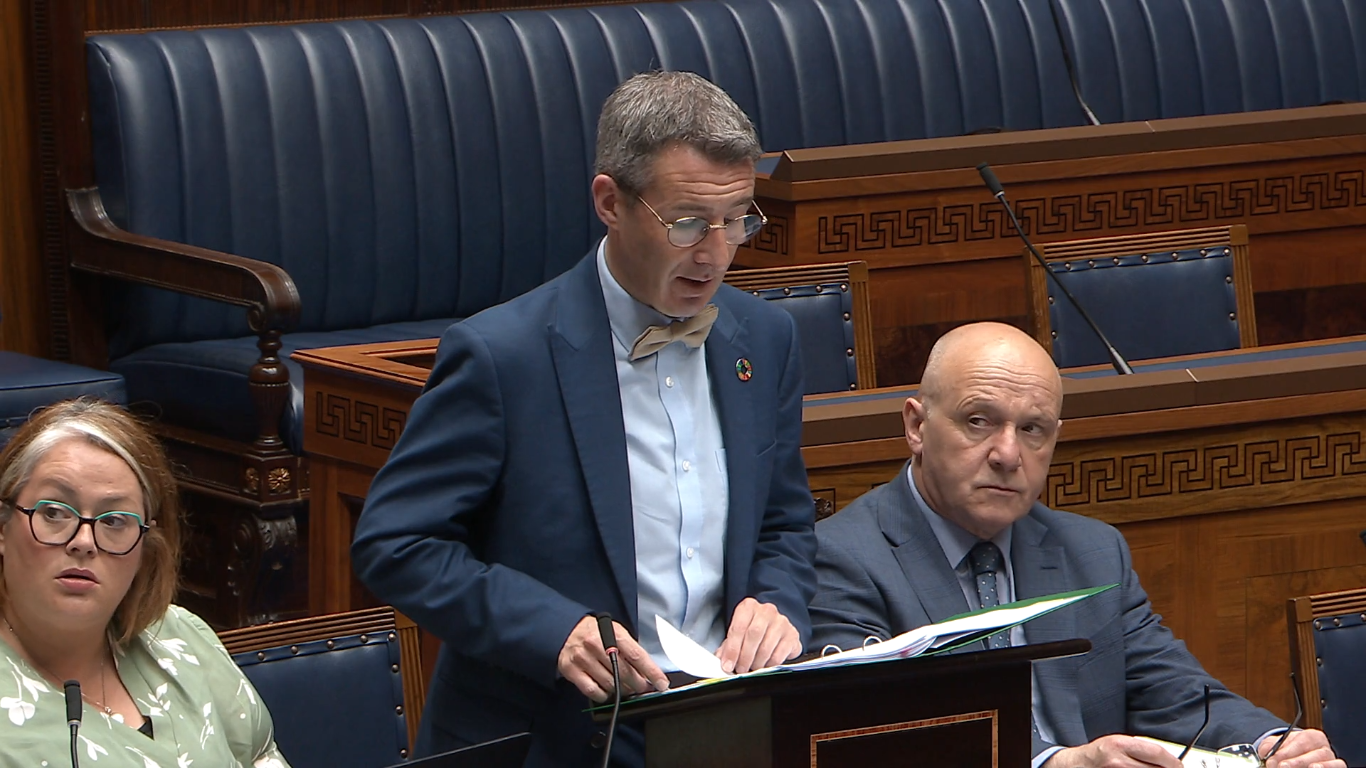
The Minister of Agriculture, Environment and Rural Affairs brought the draft Fisheries Act 2020 Regulations (NI) 2024 to the Chamber
For 2024-25, grant support will be offered under the following themes: investments on board fishing vessels and training; fisheries innovation, science and partnerships; environment and conservation action; blue carbon restoration; development of Northern Ireland's aquaculture; the processing and marketing of fish and aquaculture produce; and fishing port infrastructure.
Jim Allister MLA highlighted that “under the protocol, the scheme is capped.” He stated that only Northern Ireland is subject to state aid rules under Article 10 of the protocol and these “have specified the maximum that the Minister can grant under the scheme to the fishing industry.”
The Assembly approved the Regulations.
Working time regulations
On 25 June, the Minister for the Economy brought the draft Working Time (Amendment) Regulations (Northern Ireland) 2024 to the Chamber for approval. He told the Chamber that the draft regulations “seek to provide clarity in our legislation and restate certain statutory rights in relation to shared parental, parental bereavement, adoption and paternity leave. The purpose of the regulations is to remove any potential uncertainty in law about previously agreed and accepted annual leave entitlements following our exit from the EU.” The regulations were approved.
North South Ministerial Council
Environment
In Plenary on 25 June, the Minister of Agriculture, Environment and Rural Affairs made two statements relating to the North/South Ministerial Council (NMSC). His first statement informed the Chamber of the twenty-fourth NSMC environment meeting on 10 June.
Regarding the work programme of the NSMC environment sector, Minister Muir told the Assembly that “Ministers noted that both jurisdictions place a strong focus on efforts to tackle the challenges surrounding climate change, biodiversity loss and pollution and agreed a revised work programme for the environment sector.”
The Minister told the Assembly that the NSMC “welcomed the strong links between research bodies in both jurisdictions in the field of environmental research and agreed that both Administrations will continue to work together to maximise opportunities in environmental research, including those offered by PEACE PLUS, Horizon Europe, Ireland’s North/South research programme and the jointly funded research co-centres.”
The Minister told Members that the Council noted the issue of blue-green algae and its impacts on water quality and the safety of water use. The current position in relation to the particular challenges surrounding Lough Neagh was highlighted. The NSMC noted that departmental officials and stakeholders across both jurisdictions are actively sharing knowledge and expertise on water quality issues including through the North/South water framework directive coordination group.
Aquaculture and marine
The Minister of Agriculture, Environment and Rural Affairs’ second statement concerned the thirty-first meeting of the North/South Ministerial Council (NSMC) in the aquaculture and marine sectoral format, which was held on 10 June. Minister Muir told the Chamber that the NSMC approved Loughs Agency business plans, budgets and cash grants for 2022, 2023 and 2024, as well as the Loughs Agency three-year corporate plan. He said “[t]hose approvals regularise spend for plans that were unable to be approved in the absence of the NSMC.”
Transport
On 2 July, the Minister for Infrastructure made a statement on the meeting of the NSMC in the transport sectoral format, which was held on 27 June. Minister O’Dowd told the Chamber that the NSMC agreed that “the A5 dualling and cross-border linked road projects, including the N2 Clontibret to Border road scheme and the Donegal Trans-European Transport Network (TEN-T) upgrades, were critical to the development of the region, improving road safety and stimulating economic growth.”
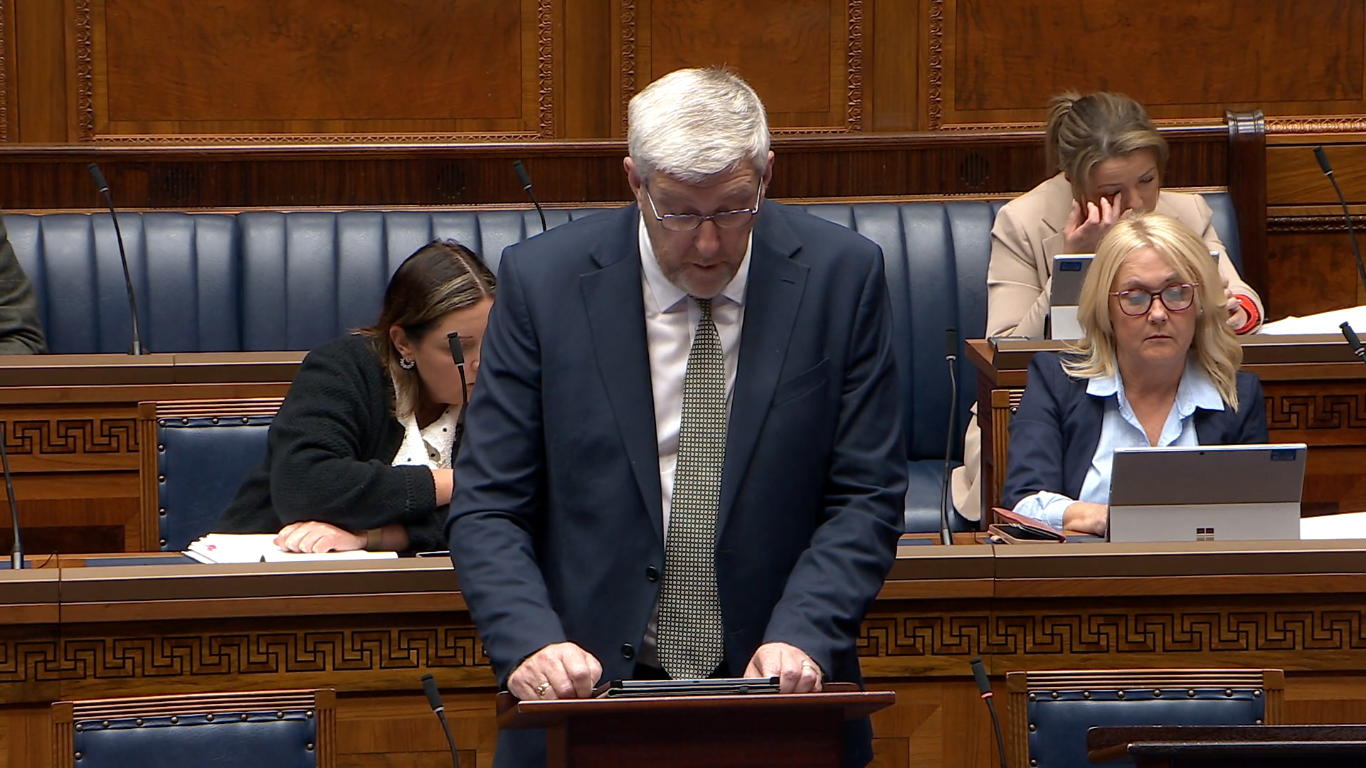
The Minister for Infrastructure made a statement on the meeting of the NSMC in the transport sectoral format
The Minister for Infrastructure that NSMC welcomed the allocation of funding by the Government of Ireland of €12·5 million from the Shared Island Fund with match funding from the Department of Transport (DOT) to meet the total cost of introducing an hourly rail service between Belfast and Dublin over an initial three-year period. Minister O’Dowd told the Assembly the Council also welcomed progress on the EU-funded Connecting Europe Facility and INTERREG projects.
Inland Waterways
On the same day, the Minister for Infrastructure made a second statement on the NSMC meeting in inland waterways sectoral format, which was held on 19 June. Ministers welcomed the achievements of Waterways Ireland since the last meeting.
Tourism
The Minister for the Economy then made a statement to the Assembly on the NSMC meeting in tourism sectoral format which was held on 24 June. Minister Murphy told the Chamber that the Council noted the outcome of the review of the work programme for the Tourism Sector, and agreed an addendum to the work programme. The NSMC welcomed the Joint Ministerial Statement supporting Sustainable Tourism and agreed the establishment of a Joint Strategic Coordination Group to identify and examine opportunities that will support the sustainable growth of the tourism sector across the island.
Asked about the electronic travel authorisation (ETA) scheme, Minister Murphy said he discussed the issue with Catherine Martin TD, the Minister for Tourism, Culture, Arts, Gaeltacht, Sport and Media. He confirmed he had written to the outgoing UK government and stated his intention “that the Executive as a whole will take a position and present it to the incoming Government in London at the earliest opportunity to ensure that we offset the plans that have been put in place for the scheme.”
British-Irish Council: Forty-first Summit
The British-Irish Council (BIC) held its forty-first summit on 21 June on the Isle of Man. The deputy First Minister made a statement to the Assembly on 2 July. She attended the meeting with junior Minister Aisling Reilly and the Minister for the Economy. The theme of the summit was "Unlocking the economic and social opportunities of renewables across these islands". Deputy First Minister Little-Pengelly told the Assembly that the Council discussed various ways administrations are developing initiatives to realise the opportunities of renewable energy to stimulate economic growth and support decarbonisation efforts.
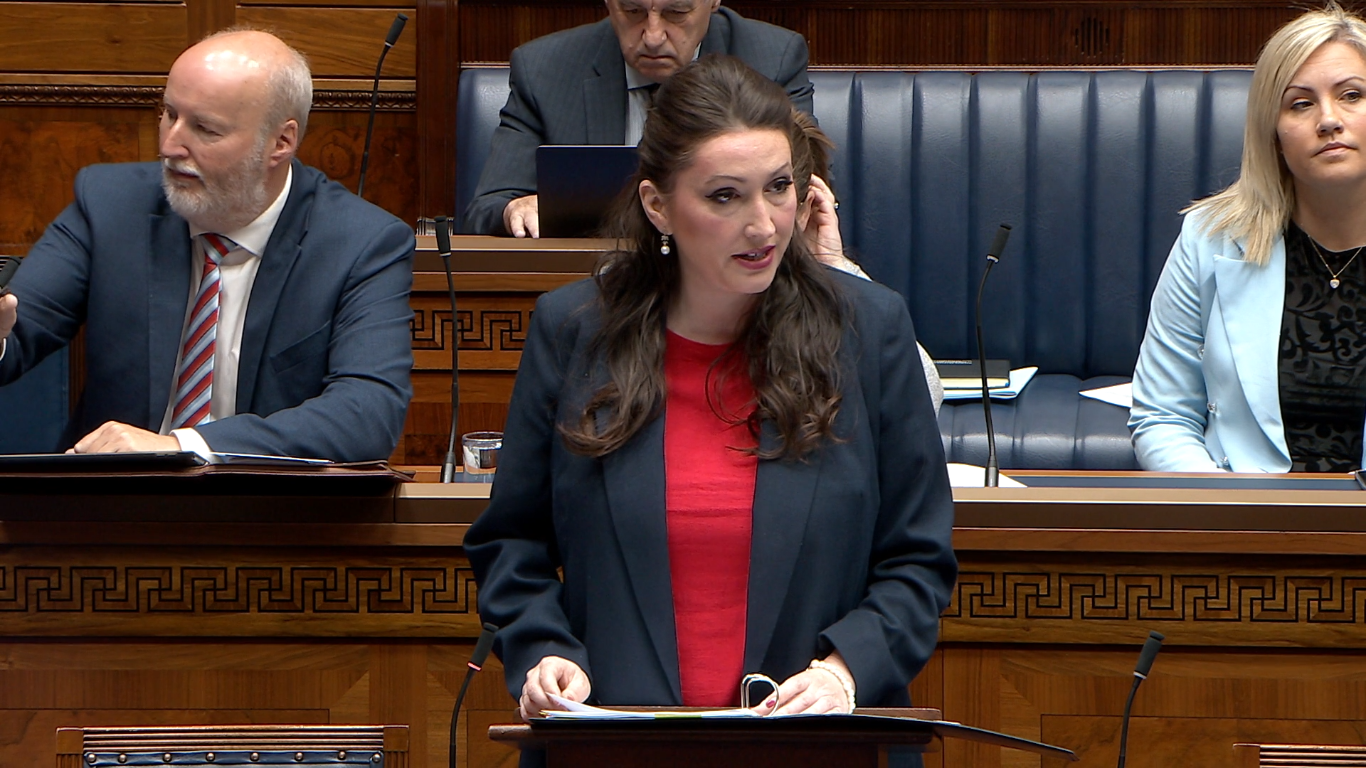
The deputy First Minister made a statement on the British-Irish Council summit on 21 June
Committee for Agriculture, Environment and Rural Affairs
On Thursday 20 June the Committee for Agriculture, Environment and Rural Affairs received a briefing on the Legacy EU Common Market Organisation (CMO) Schemes. The Committee heard evidence on a proposed Bill to provide powers to amend two legacy EU CMO schemes: the fruit and vegetable aid scheme (FVAS); and the agri-food information and promotions scheme.
Officials told Members that prior to the end of EU transition, the UK participated in and received funding for CMO schemes. The CMO legislation was converted into UK law when the UK left the EU. The schemes are governed by legislation that originated in the EU and are now assimilated law.
Following the end of EU transition, funding for the FVAS in Northern Ireland is the responsibility of DAERA. Officials told the Committee there are budget implications, with the potential for new three-year programmes to be submitted for approval next autumn.
The Committee heard that the Department consulted on proposals that would make FVAS funding discretionary and provide the enabling powers to provide amendments to assimilated law covering both schemes. Departmental officials reported a mixed response to the proposal to make the FVAS support discretionary, but most stakeholders “appeared to understand the need for the Minister to have the scope to fully decide on DAERA's future funding policies to provide support where it provides best value for money.” The Committee also heard there was clear support for the need to have the powers to provide for developing policy. The Department proposed to bring forward a Bill, subject to Executive agreement, that would make FVAS funding discretionary and empower DAERA to modify the legislation governing the two legacy EU schemes.
The Committee was also briefed by the Mushroom Producer Organisation and Commercial Mushroom Growers UK. They highlighted that the benefit of the FVAS is that it gives certainty to growers for long-term planning. However, they asserted, “[t]he term "discretionary" is concerning to the industry. It has led to a lot of uncertainty for growers, because they cannot plan and do not know where they are going. It is real concern for our growers, as you already heard.”
The Northern Ireland Mushroom Growers Association gave evidence to the Committee and identified some key challenges for the industry, including a lack of staff availability to optimise crop harvesting. It told the Committee the current seasonal agricultural workers scheme (SAWS) is limited to six months, which does not meet the needs of the industry. It argues this should be extended to a minimum of two years.
The Draft Producer Responsibility Obligations (Packing and Packaging Waste) Regulations 2024
The Committee noted The Draft Producer Responsibility Obligations (Packing and Packaging Waste) Regulations 2024. This Statutory Instrument (SI) is a UK wide piece of legislation and will be laid in Westminster by the end of 2024. Consent from Minister Muir has been granted for it to be made in respect of Northern Ireland. ‘Packing EPR’ is within Directive 64/62/EC on packaging and packaging waste, which sits in Annex 2 of the Windsor Framework. The legislation introduces Extended Producer Responsibility for packaging (pEPR) and in doing so fulfils commitments made by the UK Government and Devolved Administrations to introduce pEPR.
This instrument moves the cost of dealing with household packaging waste from local councils to those producers who use and supply packaging, giving them financial responsibility for their packaging throughout its life cycle.
Windsor Framework Democratic Scrutiny Committee
At its meeting of the 20 June, the Windsor Framework Democratic Scrutiny Committee received a briefing on Regulation (EU) 2024/1610 strengthening the CO2 emission performance standards for new heavy-duty vehicles from officials from the Department for Infrastructure. The departmental official told Member this brings “a minor change to a definition to introduce the concept of an e-trailer.” She said the Department for Transport has advised “there would be minimal impact” because “there are very few trailer manufacturers here in Northern Ireland.” The Committee considered legal advice and the evidence received and decided not to hold an inquiry into the EU act.
Committee for the Economy
On 26 June, the Economy Committee received a briefing from the Minister for the Economy and the Department’s Permanent Secretary on the Budget 2024-25 and Policy and Legislative Programme. The Committee heard that the Department wants to make the most of the dual market access opportunities by supporting local businesses to export and to attract inward investment. It has worked with Queen's University and the UK Trade Policy Observatory to publish information that helps businesses to understand the types of products and sectors where dual market access opportunities could be exploited.
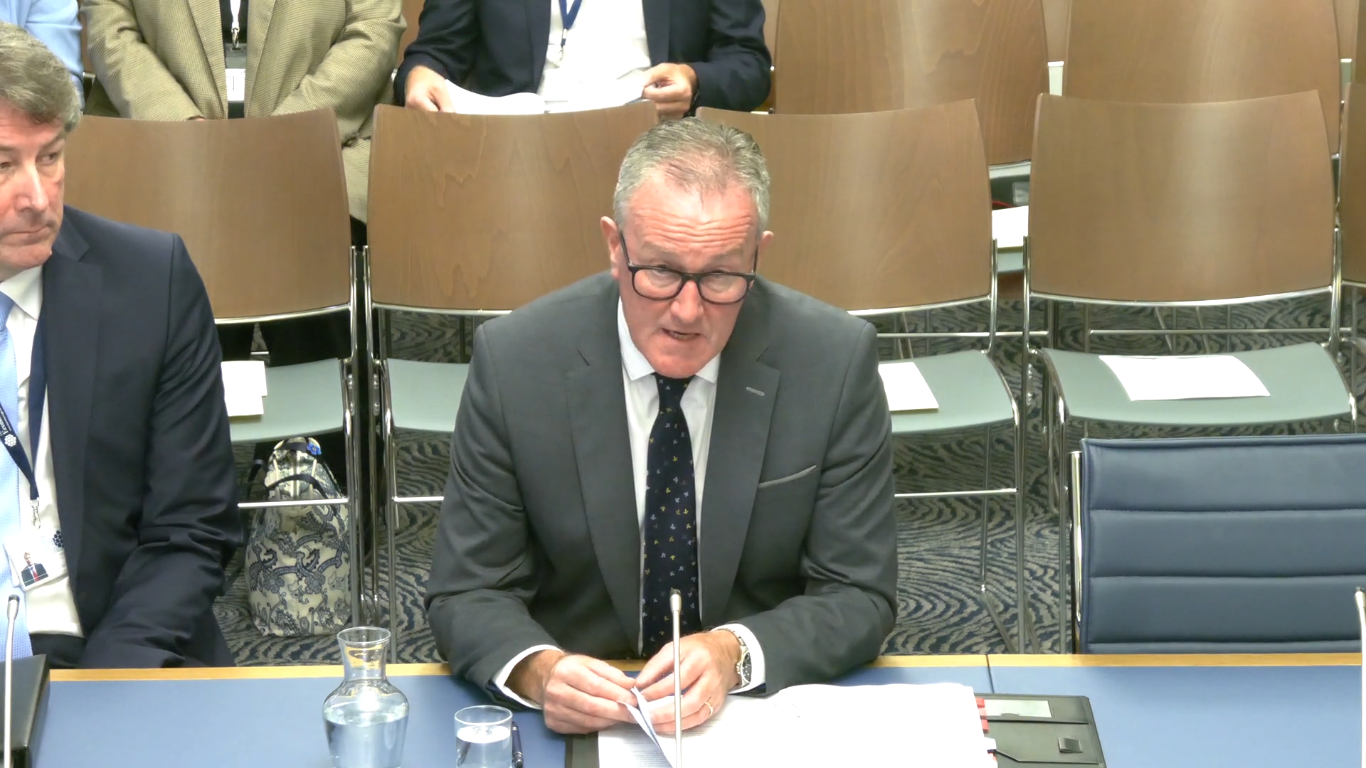
The Minister for the Economy and his Permanent Secretary gave evidence on the Budget and Policy and Legislative Programme
Minister Murphy reported that his Department and Invest NI recently held their first co-design workshop with a range of business representatives. He said that working with InterTradeIreland and the relevant partners in Britain, Invest NI plans to establish a dedicated team to maximise dual market opportunities.
Regarding June monitoring, the Minister told the Committee there is an additional £32 million of Treasury funds due to be allocated to the Department. This includes £16 million to fund ongoing work related to Protocol/Windsor Framework and £16 million to support additional skills and entrepreneurship programmes and to advance international expansion.
The Permanent Secretary told Members that engagement with NI businesses has shown that a key challenge is that a lot of the dual market access discussion is incredibly technical and complicated. He said “[w]e need to turn that information into something that is easily communicable to and understandable by the business community. Effectively, it wants to know, "What does it mean for me? What do I need to do? How can I make this work?"”.
The Protocol on Ireland/Northern Ireland / Windsor Framework: polling and analysis
On Friday 21 June, the QUB Post-Brexit Governance NI project team at Queen’s University, published its latest report on the voters’ attitudes in Northern Ireland on issues relating to the Protocol/Windsor Framework.
Professors David Phinnemore and Katy Hayward presented their analysis of the findings of their most recent LucidTalk polling at this month’s Post-Brexit Clinic.
The report concludes that the impact the Safeguarding the Union deal had in softening negative views of the Protocol/Windsor Framework appears to have already been reversed. Polling data shows that 51% of respondents see the Protocol/Windsor Framework as an appropriate means for managing the effects of Brexit on Northern Ireland. The project team notes this is “a significant drop from 60% in February 2024 and back to pre-Windsor Framework levels.”
The project team notes that the most positive views are on its economic consequences of the Protocol/Windsor Framework. 68% of respondents continue to think the Protocol/Windsor Framework offers unique opportunities that could benefit Northern Ireland. Furthermore, polling shows that Northern Ireland business representatives continue to be the actors most trusted (56%) to manage Northern Ireland’s interests with respect to the Protocol/Windsor Framework; only 18% of respondents distrust them.
The Assembly's first vote on Articles 5-10 of the Windsor Framework – the parts of the Framework under which Northern Ireland applies regulations relating to the EU single market – will take place in November/December 2024. Read our explainer of the process here.
The poll confirms that most respondents (89%) have a view on how they wish their MLAs to vote. A majority (57%) are in favour of the continued application of Articles 5-10 (see the chart below). This is in line with the three previous polls conducted by the project in June and October 2023 and February 2024. Almost a third of respondents (32%) are against continued application.
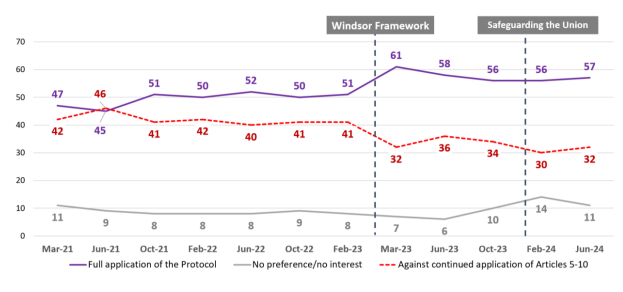
Democratic Consent: Based on what you currently know, and are experiencing now, how would you like the MLAs for whom you vote[d] in the 2022 NI Assembly election to vote in 2024 on the Protocol/Windsor Framework? (All polls)
European Political Community
The next meeting of the European Political Community (EPC) will be held next week on 18 July 2024 at Blenheim Palace. This will be the fourth meeting of the EPC which first met in October 2022 and the first for new Prime Minster Sir Keir Starmer. This follows his participation in the NATO summit in Washington earlier this week.
The EPC meeting will bring together over 40 political leaders from across Europe and Euractiv reports that “The meeting is expected to serve as a chance for countries to reaffirm continued support for Ukraine, with a closer look at other crises in Europe’s neighbourhood. It will also be an opportunity to see, how the new UK government approaches relations with European countries and the EU.”
Other news
- Following the change of Government, the Centre for European Reform asks if the UK should pursue dynamic alignment with the EU.
- A new UCL Constitution Unit report by Alan Whysall sets out the challenges that the next Westminster government will have to face on Northern Ireland issues.
- Euractiv reports on the estimations per age and gender of how Europeans voted in the EU elections. It refers to data aggregation of EU election exit polls that suggests young voters stayed away from far-right parties, while men overall tended to support radical right parties somewhat more than women.
- Former Swiss President Alain Berset was elected Secretary General of the Council of Europe, the parliamentary arm of the continent’s human rights organisation. He will take up the role on 18 September.
- On Sunday 30 June, Hungarian Prime Minister Viktor Orbán presented a new alliance with Austria's far-right Freedom Party and the main Czech opposition party, ANO, which hopes to attract other partners and become the biggest hard right-wing group in the European Parliament.
- The Irish Government proposed Michael McGrath, Minister for Finance, for nomination as a Member of the European Commission on 25 June. If Ursula von der Leyen is endorsed for another term as President of the European Commission, it is likely that she will once again ask each member state government to submit two options as Commission nominees - a female and a male candidate.
- Euractiv reports that the EU’s CO2 tariff (the Carbon Border Adjustment Mechanism (CBAM)) continues to cause confusion within the business community. We have previously reported on the potential issues for CBAM and Northern Ireland.



